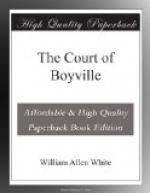Back of Pennington’s barn, which was the royal castle of the Court of Boyville, ran a hollow. In the hollow grew a gnarly box-elder tree. This tree was the courtiers’ hunting-lodge. In the crotches of the rugged branches Piggy Pennington, Abe Carpenter, Jimmy Sears, Bud Perkins, and Mealy Jones were wont to rest of a summer afternoon, recounting the morning’s adventures in the royal tourney of the marble-ring, planning for the morrow’s chase, meditating upon the evil approach of the fall school term, and following such sedentary pursuits as to any member of the court seemed right and proper. One afternoon late in August the tree was alive with its arboreal aristocracy. Abe Carpenter sat on the lowest branch, plaiting a four-strand, square-braided “quirt”; Jimmy Sears was holding the ends. Piggy was casually skinning cats, hanging by his legs, or chinning on an almost horizontal limb, as he took his part in the lagging talk. Hidden by the foliage in the thick of the tree, in a three-pronged seat, Bud Perkins reclined, his features drawn into a painful grimace, as his right hand passed to and fro before his mouth, rhythmically twanging the tongue of a Jew’s-harp, upon which he was playing “To My Sweet Sunny South Take Me Home.” He breathed heavily and irregularly. His eyes were on the big white clouds in the blue sky, and his heart was filled with the poetry of lonesomeness that sometimes comes to boys in pensive moods. For the days when he had lived with his father, a nomad of the creeks that flowed by half a score of waterways into the Mississippi, were upon the far horizon of his consciousness, and the memory of those days made him as sad as any memory ever can make a healthy, care-free boy. He played “Dixie,” partly because it was his dead father’s favorite tune, and partly because, being sprightly, it kept down his melancholy. Later he took out a new mouth-organ, which his foster mother had given to him, and to satisfy his boyish idea of justice played “We shall Meet, but We shall Miss Him,” because it was Miss Morgan’s favorite. While he played the Jew’s-harp his tree friends flung ribald remarks at him. But when Bud began to waver his hand for a tremulo upon the mouth-organ as he played “Marsa’s in de Col’, Col’ Groun’,” a peace fell upon the company, and they sat quietly and heard his repertoire,—“Ol’ Shadey,” “May, Dearest May,” “Lilly Dale,” “Dey Stole My Chile Away,” “Ol’ Nicodemus,” “Sleeping, I Dream, Love,” and “Her Bright Smile.” He was a Southern boy—a bird of passage caught in the North—and his music had that sweet, soothing note that cheered the men who fought under the Stars and Bars.
Into this scene rushed Mealy Jones, pell mell, hat in hand, breathless, bringing war’s alarms. “Fellers, fellers,” screamed Mealy, half a block away, “it’s a-comin’ here! It’s goin’ to be here in two weeks. The man’s puttin’ up the boards now, and you can get a job passin’ bills.”




